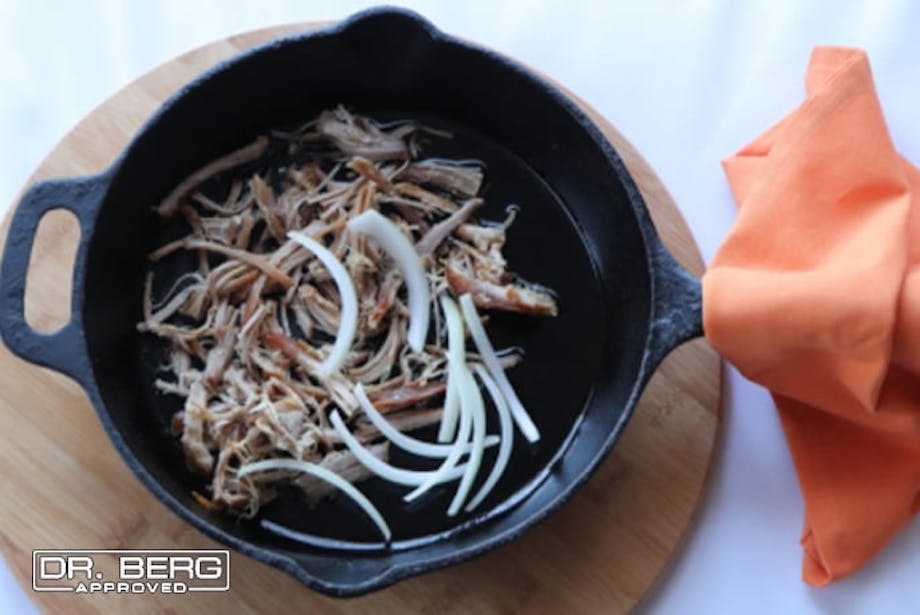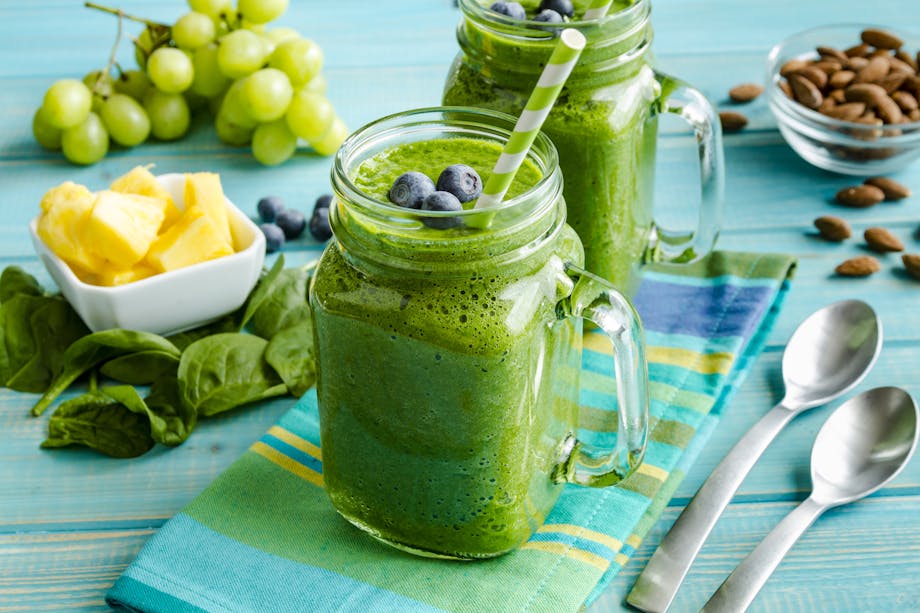Keto-Pulled Pork Breakfast
By Dr. Eric Berg DC
05/12/2024
Keto-Pulled Pork Breakfast
Total Time: 10 mins
Serves: 1
Per serving: 650 calories, 35 g protein, 5 g carbohydrates, 45 g fat
Ingredients
3 ounces of pulled pork
2 Tbsp onions
1 Tbsp coconut oil
2 large eggs
½ avocado
Directions:
Cook pork and onions in coconut oil in a pan over medium heat.
While pork is cooking, fry two large eggs in another pan with remaining coconut oil.
Serve cooked pork and eggs together, topped with sliced avocado.
Recipe tips:
Mix scrambled eggs with the pork instead of serving alongside fried eggs for a different texture.
For variety, make low-carb pulled pork hash by chopping leftover pork and frying it with cauliflower rice and diced onions.
Serve with keto-friendly vegetables such as sautéed spinach or roasted Brussels sprouts instead of high-carb breakfast potatoes.
Sprinkle with kosher salt and freshly ground black pepper for added flavor.
Substitute coconut oil with extra virgin olive oil if preferred.

When following a low-carb diet, breakfast choices can be limited. This nutritious keto-pulled pork breakfast recipe meets keto guidelines and is easy to make.
This tasty breakfast, made with nutrient-rich ingredients and ready in just ten minutes, lets you indulge in a hearty meal without breaking ketosis.
Why you’ll love this keto-friendly recipe
The ingredients in this keto-pulled pork breakfast are not only delicious but offer significant health benefits.
Pulled pork is an excellent source of high-quality protein, crucial for keeping you satiated and aiding the repair and growth of muscles.
Meanwhile, the coconut oil used in cooking is rich in medium-chain triglycerides, known for their energy-boosting properties.
Avocados are rich in heart-healthy monounsaturated fats and fiber, supporting weight management and cardiovascular health.
Research published in Nutrition Journal found that avocado consumers have higher intakes of healthy fats, dietary fiber, and essential nutrients, including vitamins E and K, magnesium, and potassium.
The study further discovered that those who regularly incorporated avocado into their diet had lower intakes of added sugars. The authors summarize avocado consumption enhances nutritional intake and may reduce the risk of developing metabolic diseases.
Moreover, this delicious recipe calls for eggs, a great source of vitamin B12 and vitamin D, needed for bone health and energy metabolism.
The blend of nutrient-rich and flavorful ingredients creates a fulfilling breakfast experience that energizes your body while pleasing your palate.
It's also an ideal choice for anyone following a gluten-free diet, as this recipe is entirely grain-free.
This versatile dish can be personalized with different seasonings, such as hot sauce, low-carb BBQ sauce, or a sprinkle of paprika for added heat.

Health benefits of pork
Regularly eating pork has various health benefits when consumed as part of a nutritious diet.
Pork contains essential vitamins and minerals, including vitamin A, zinc, phosphorus, and selenium, which are vital for energy metabolism, immune function, and overall health.
Furthermore, high-fat cuts of pork, such as pork shoulder, can satisfy your caloric needs on a keto diet.
In addition, contrary to common belief, research published in the International Journal of Food Science found that consuming omega-3-rich pork could be beneficial for promoting balanced blood lipid fat levels.
The study also found that using pork lard as cooking oil may benefit individuals with high cholesterol levels or hyperlipidemia.
It’s believed that fatty acids in pork fats serve as an effective fuel source for certain gut microbes, which have been linked to metabolic balance, improved blood lipid markers, and a lower risk of elevated cholesterol.
Pork also provides amino acids, including lysine and tryptophan, necessary for protein synthesis and neurotransmitter regulation.

Conventional vs. organic, grass-fed meat
When choosing meat to prepare pulled pork, it's essential to consider the source and quality of the cuts, which typically are pork butt or shoulder.
Conventional meat products may contain added hormones and antibiotics and often come from livestock raised on a diet high in genetically modified organisms (GMOs).
These animals are usually fed grains such as corn and soy, which don’t resemble a natural diet and are linked to low-quality meats with poor nutritional value.
Meanwhile, organic and ethically-raised grass-fed options are typically free from potentially harmful substances and offer a significantly higher nutrient content.
"Grass-fed meat contains more beneficial fats such as omega-3 fatty acids than conventional pork," explains Dr. Berg. "It’s also rich in vitamin E, beta-carotene, and conjugated linoleic acid (CLA), a potent antioxidant with potential anti-cancer benefits."
Moreover, grass-fed meat is raised more humanely and environmentally friendly.

What to serve with this keto breakfast recipe
Unless you practice intermittent fasting, a well-rounded breakfast is essential for starting your day off right and keeping you satiated until lunchtime.
Here are some keto-friendly options to serve with your pulled pork breakfast.
Kale shake
Nutrient-packed and refreshing, this kale shake is a delicious way to increase your intake of green vegetables without raising your blood sugar levels.
To make this shake, blend a handful of kale, water, and frozen berries until smooth.
A kale shake complements the flavors of the pulled pork and eggs, making it the perfect drink for your keto breakfast.
Avocado toast
Are you craving creamy avocado toast but trying to avoid bread?
This avocado toast recipe, made with almond flour bread, is a great low-carb alternative that pairs well with pulled pork hash.
Top it off with some cherry tomatoes and a sprinkle of sea salt for added taste.
French toast egg loaf
This French toast with keto egg loaf is a keto-friendly twist on traditional high-carb French toast.
This recipe, made with almond flour, eggs, and cinnamon, pairs perfectly with the pulled pork breakfast and adds variety to your morning routine.

Bulletproof coffee
Start your day with bulletproof coffee to boost energy and promote ketosis.
Black coffee is blended with healthy fats from grass-fed butter and medium-chain triglyceride (MCT) oil, providing sustained energy and mental clarity throughout the morning.
Adding butter and MCT oil to coffee is also a great alternative to traditional creamers, which can be high in carbs and sugar.
Ketogenic cornbread
What's better than pulled pork and cornbread?
The slightly sweet flavor of this keto cornbread pairs wonderfully with the savory flavors of pulled pork, making it a perfect side dish for your early meal.
Keto cajun waffle fries
Try these keto Cajun waffle fries for a unique and delicious twist on a classic dish.
Crafted from cauliflower, eggs, parmesan cheese, and Cajun seasoning, these savory waffles are a great accompaniment to pulled pork and add extra crunch to your breakfast.

Storage and reheating tips
This pork breakfast is ideal for meal prep and can be stored in the fridge for up to four days.
If you have any leftover pulled pork, you can freeze it for up to three months. Be sure you keep pulled pork in a freezer-safe bag to avoid freezer burn, which negatively impacts the flavor and texture of the meat.
You can freeze individual portions for a convenient breakfast option and defrost pulled pork overnight in the refrigerator before reheating.
To reheat, simply place leftover meat in a pan over medium-high heat and cook until warm.

Key takeaways
This keto-pulled pork breakfast recipe contains delicious and nutritious ingredients, including avocados, eggs, and pork.
Pair this low-carb dish with keto-friendly sides, such as a kale shake, avocado toast, or bulletproof coffee, for a well-rounded breakfast to fuel your body while keeping you in fat-burning mode.
FAQ
1. Can I have pork on keto?
Yes, you can eat pork on keto as it’s low in carbs and a rich source of healthy fats.
However, it's essential to consider the source and quality of the meat to avoid added hormones or antibiotics.
2. Is pulled pork healthy?
Pulled pork is typically made with pork shoulder, which is considered a healthy choice as it provides vitamins and minerals, including vitamin A, zinc, and selenium.
To maximize the nutritional value of your meal, opt for organic or grass-fed options rich in omega-3 fatty acids and essential nutrients.
3. Is pulled pork fine if I’m trying to lose weight?
Incorporating pork into your diet can help improve body composition without causing adverse effects on weight.
However, it’s crucial to avoid high-carb side dishes typically served alongside pulled pork, such as yellow potatoes or breakfast hash browns, if you are trying to lose weight.
4. Which is healthier, pulled pork or chicken?
When prepared properly, pulled pork and chicken can be a healthy addition to your diet.
Pulled pork contains more fat than chicken, making it an excellent option for those following a high-fat ketogenic diet.
5. Is smoked pulled pork healthy?
Smoked pulled pork can be healthy if it has been smoked using traditional methods or in a smoker with wood chips.
Avoid products that use liquid smoke or artificial flavorings, which can cause sensitivities and have been linked to inflammation and poor gastrointestinal health.






